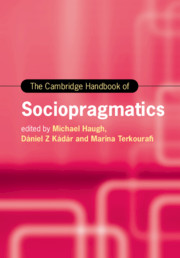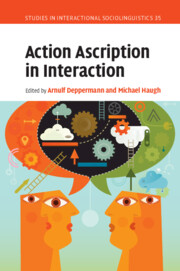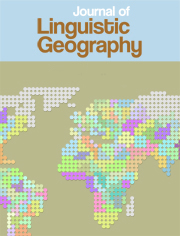The Cambridge Handbook of Sociopragmatics
Sociopragmatics is a rapidly growing field and this is the first ever handbook dedicated to this exciting area of study. Bringing together an international team of leading editors and contributors, it provides a comprehensive, cutting-edge overview of the key concepts, topics, settings and methodologies involved in sociopragmatic research. The chapters are organised in a systematic fashion, and span a wide range of theoretical research on how language communicates multiple meanings in context, how it influences our daily interactions and relationships with others, and how it helps construct our social worlds. Providing insight into a fascinating array of phenomena and novel research directions, the Handbook is not only relevant to experts of pragmatics but to any reader with an interest in language and its use in different contexts, including researchers in sociology, anthropology and communication, and students of applied linguistics and related areas, as well as professional practitioners in communication research.
- Gives a systematic and accessible overview of sociopragmatics
- Provides cutting-edge insights and suggests future directions for sociopragmatic research from many of the best-known experts in the field
- Covers topics that represent the 'applied', socially-relevant aspects of language use
Product details
April 2021Hardback
9781108844963
650 pages
254 × 182 × 47 mm
1.55kg
Available
Table of Contents
- 1. Introduction: directions in sociopragmatics Michael Haugh, Dániel Z. Kádár and Marina Terkourafi
- Part I. Fundamentals of Sociopragmatics:
- 2. Sociopragmatics: roots and definition Jonathan Culpeper
- 3. Inference and implicature Marina Terkourafi
- 4. Speaker meaning, commitment and accountability Chi-Hé Elder
- 5. Social actions Arnulf Deppermann
- 6. Stance and evaluation Maarit Siromaa and Mirka Rauniomaa
- 7. Reflexivity and meta-awareness Jef Verschueren
- 8. Participation and footing Elizabeth Holt and Jim O'Driscoll
- 9. Conventionalisation and conventions Dániel Z. Kádár and Juliane House
- 10. Synchronic and diachronic pragmatic variability Anne Barron
- 11. Activity types and genres Dawn Archer, Piotr Jagodziński and Rebecca Jagodziński
- 12. Social groups and relational networks Diana Boxer and Florencia Cortés-Conde
- Part II. Topics and Settings in Sociopragmatics:
- 13. Face, facework and face-threatening acts Maria Sifianou and Angeliki Tzanne
- 14. Relationships and relating Robert Arundale
- 15. Analysing identity Pilar Garcés -Conejos Blitvich and Alexandra Georgakopoulou
- 16. (Im)politeness and sociopragmatics Jonathan Culpeper and Michael Haugh
- 17. Affect and emotion Laura Alba-Juez
- 18. Power Michiel Leezenberg
- 19. Morality in sociopragmatics Pilar Blitvich and Dániel Z. Kádár
- 20. Conversational humour Marta Dynel and Valeria Sinkeviciute
- 21. Gesture and prosody in multimodal communication Lucien Brown and Pilar Prieto
- 22. Digitally-mediated communication Chiaoqun Xie and Francisco Yus
- 23. Workplace and institutional discourse Meredith Marra and Shelley Dawson
- 24. Service encounter discourse J. César Félix-Brasdefer and Rosina Márquez-Reiter
- 25. Argumentative, political and legal discourse Anita Fetzer and Iwona Witczak-Plisiecka
- 26. The pragmatics of translation Juliane House
- Part III. Approaches and Methods in Sociopragmatics:
- 27. Interpersonal pragmatics Miriam Locher and Sage Lambert Graham
- 28. Sociocognitive pragmatics Istvan Kecskes
- 29. Conversation analysis and sociopragmatics Rebecca Clift and Michael Haugh
- 30. Corpus pragmatics Svenja Adolphs and Yaoyao Chen
- 31. Variational pragmatics Klaus P. Schneider
- 32. Historical sociopragmatics Magdalena Leitner and Andreas H. Jucker
- 33. Emancipatory pragmatics Scott Saft, Sachiko Ide and Kishiko Ueno
- 34. Cross-cultural and intercultural pragmatics Troy McConachy and Helen Spencer-Oatey
- 35. Second-language pragmatics Elly Ifantidou.




